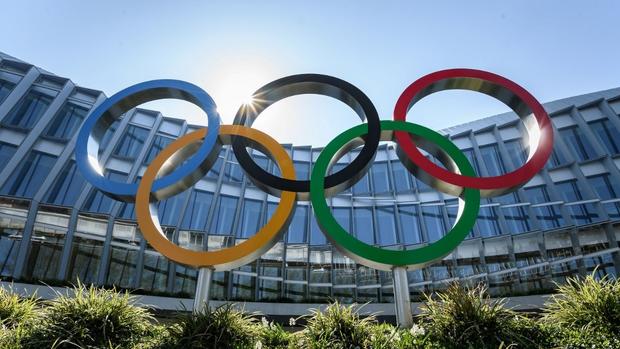 In this March 24, 2020 photo, Olympic Rings are seen a the headquarters of the International Olympic Committee (IOC) in Lausanne amid the spread of the COVID-19. (Fabrice COFFRINI / AFP)
In this March 24, 2020 photo, Olympic Rings are seen a the headquarters of the International Olympic Committee (IOC) in Lausanne amid the spread of the COVID-19. (Fabrice COFFRINI / AFP)
The organizers of the delayed Tokyo Olympics unveiled a set of rules governing how teams move about and interact in order to avoid the spread of the COVID -19 pathogen, assuming that the games will go ahead this summer as planned.
Coronavirus tests will be conducted before and after arrival in Japan and then at least every four days, with movements in the country limited to a pre-determined plan, according to the first version of the “Playbook” unveiled on Wednesday. The document was prepared by the Tokyo Organizing Committee, the International Olympic Committee and the International Paralympic Committee.
Japan implemented stricter measures last month seeking to reduce infections and pave the way for the Olympics, which were postponed last year
The protocols outlined in the playbook are aimed at holding a successful games even as countries across the globe struggle to bring the pandemic under control. Japan implemented stricter measures last month seeking to reduce infections and pave the way for the Olympics, which were postponed last year.
READ MORE: Winter Youth Olympics flame to hit Lausanne street soon
While questions linger over whether the games can be held at all, the playbook is an important step in clarifying the conditions under which they can take place. The document was light on many details, however, including how and on what schedule participants, athletes and other staff would be tested for coronavirus.
Organizers said they will decide those specifics in an update in April, in order to make use of the latest technology. Participants will need to submit a negative test before departure for Japan and may be tested on arrival.
One thing was clear: vaccinations won’t be mandatory. The organizers won’t require athletes and teams to be inoculated in order to take part, but said instead that they’ll work with each national Olympic committee to “encourage and assist their athletes, officials and stakeholders to get vaccinated in their home countries, in line with national immunisation guidelines, before they go to Japan.”
That also means that the participants will have to comply with the rules in the playbook, whether they have been vaccinated or not, they added.
ALSO READ: Tokyo Olympics director punished for 'power harassment'
Teams were told not to join events as spectators, and not to use public transport. They will also have to download Japan’s smartphone app for contact tracing. They will not have to quarantine when they arrive in the country, but they will be housed in the Olympic Village rather than being dispersed around hotels in Tokyo.
“Tokyo is the best prepared city we have ever seen,” Christophe Dubi, IOC Olympic Games Executive Director, said on video conference.
Spectator Question
Despite speculation over the future of the games, the organizers continued to insist Wednesday that they would go ahead. They cited the knowledge gained on how the virus spreads since the decision last March to postpone the Games, as well as the successful resumption of thousands of other sports worldwide among reasons for their optimism.
The playbook made no specific mention of how spectators would be handled. Decisions on that question, including the number allowed and the prospects for overseas spectators, will be made within the next few weeks, Dubi said.
The Tokyo 2020 Committee has already indicated that it will need to decide on whether to impose limits on attendance or restrict spectators from entering the country by this spring, due to the ticketing process.
The playbook will also be updated as the pandemic situation changes ahead of the games, which are set to kick off on July 23, a year after they were originally due to start.
The next version of the playbook will be released in April, when test events are carried out, Games Delivery Officer Hidemasa Nakamura of the Tokyo 2020 organizing committee said at the conference. More details on protocols for people working in close proximity to athletes will be forthcoming, Nakamura said.


